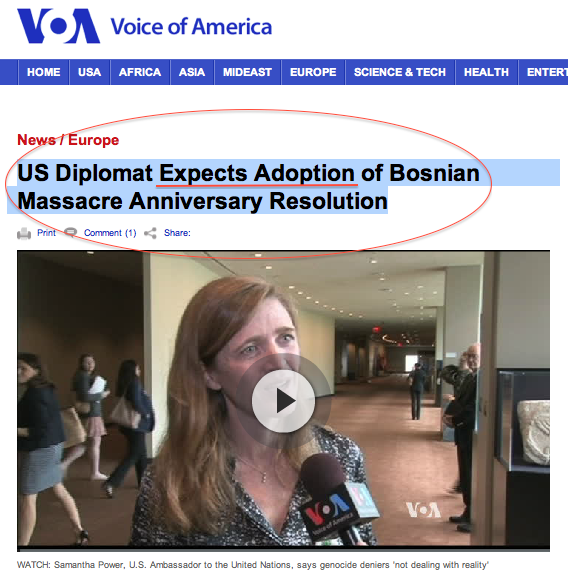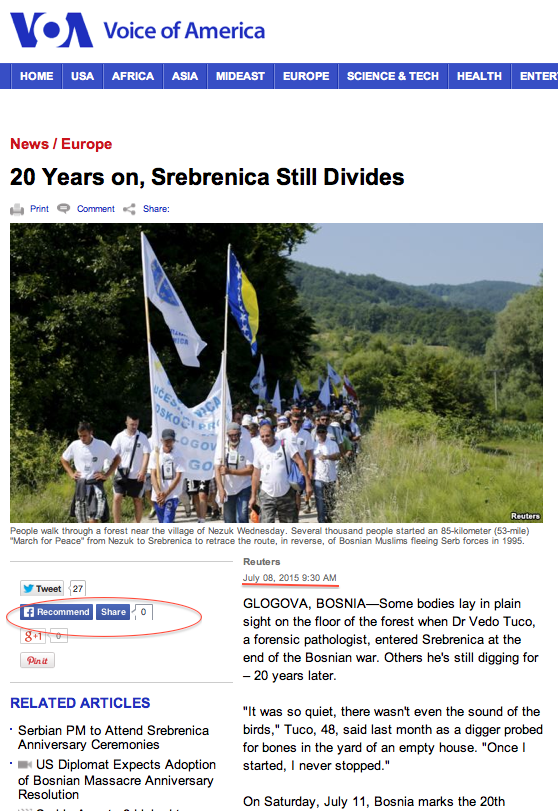BBG Watch Commentary
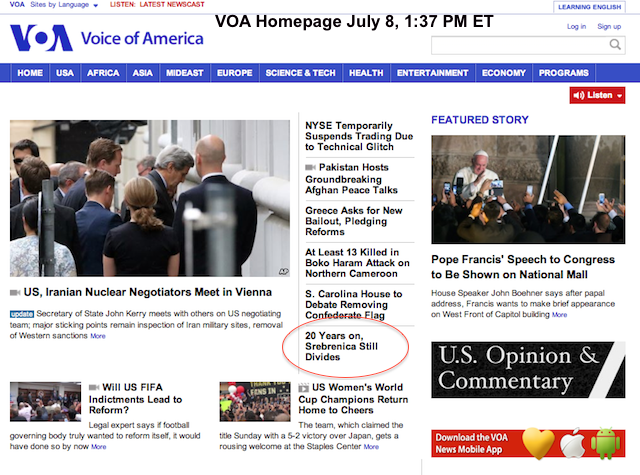
More than two hours after BBC, RT, RFE/RL and other international news organizations reported on Russia vetoing a UN Security Council resolution condemning the Srebrenica massacre as genocide committed by the Serbian army, U.S. taxpayer-funded Voice of America (VOA) as of 1:37 PM EDT July 8, 2015 still had no report on its main English language news website on the Russian veto.
An earlier VOA report made what appears to be an unsupported prediction that the UN resolution would be adopted.
While other international media were already reporting on the Russian veto, VOA featured two outdated reports, one of them from Reuters and both referring to a future UN Security Council vote. A VOA News report even predicted that the UN genocide resolution would pass “early next week,” attributing this prediction–in all likelihood inaccurately–to U.S. Ambassador to the United Nations Samantha Power. It is not clear whether VOA reporters or their editors in Washington were responsible for what appears to be a misinterpretation of Ambassador Power’s comments.
Sometime after 1:37 PM ET, a short news item, “Russia Blocks UN Resolution Recognizing Srebrenica Massacre as Genocide,” appeared on the VOA homepage with the July 08, 2015 12:01 PM dateline, but the item was not visible on the VOA homepage or VOA Europe News page until after 1:37 PM ET.
Russia’s RT was downplaying the Russian veto story by putting a short item into its Newsline rather than having a separate report, but it was available online with a headline visible on the RT homepage already at 11:44 AM ET.
BBC was quoting from U.S. Ambassador to the United Nations Samantha Power’s statement on the Russian veto long before a VOA news item appeared. It was one of the top stories on the BBC homepage.
Radio Free Europe / Radio Liberty (RFE/RL), a still somewhat independent media entity within the Broadcasting Board of Governors and less dependent on the BBG’s International Broadcasting Bureau (IBB) for technological support although under its increasing bureaucratic control, posted its report on the Russian veto, “Russia Vetoes UN Srebrenica Resolution” at about the same time as BBC and RT.
“Two international courts and many officials at the UN have used the term genocide to describe the massacre of 8,000 Muslim men and boys at Srebrenica, which occurred amid the breakup of Yugoslavia,” RFE/RL reported. RFE/RL report quoted U.S. Ambassador to the UN, Samantha Power, British Deputy Ambassador Peter Wilson, Russia’s UN Ambassador Vitaly Churkin and Serbian President Tomislav Nikolic.
RFE/RL report was both more timely and more comprehensive than the VOA report.
The Broadcasting Board of Governors is the federal agency and the federal bipartisan board which oversee VOA, RFE/RL and other U.S.-funded media outlets serving audiences abroad. VOA is operated as a federal entity. RFE/RL functions as an NGO but receives public U.S. funding through the BBG.
If indeed a VOA writer put the VOA news report on the Russian veto into the system at 12:01 PM, it took more than one hour and a half for VOA to actually post it and make it visible on its homepage and its Europe News page. Such delays are unacceptable in the highly competitive world of digital news reporting.
BBG’s interim acting CEO André Mendes said in a recent interview with Forbes Magazine: “not only are we able to establish dialogues at a much deeper level than just a one-way radio transmission, but we’re also able to a certain degree transform some of our audience into citizen journalists in certain cases providing us with an absolutely compelling content, whether it be audio, textual or even video from some of the most complicated situations in the world.
In reality, the Voice of America has been unable to update its news on its website or post them in a timely manner for years due to both managerial and technological obstacles.
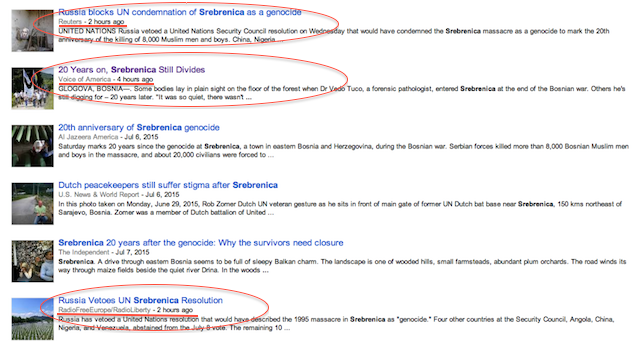
The new VOA report, and the old one from Reuters with outdated information and the July 08, 2015 9:30 AM dateline, “20 Years on, Srebrenica Still Divides” still appeared together on the VOA homepage as of 1:54 PM ET. The Reuters report on the VOA site was showing 0 (zero) Facebook “Likes” several hours after it was posted.
Another VOA report, “US Diplomat Expects Adoption of Bosnian Massacre Anniversary Resolution,” which shows it was last updated on: July 02, 2015 8:37 AM says that “The Security Council is expected to adopt the resolution on the anniversary of the Srebrenica genocide early next week.”
The video of U.S. Ambassador to the United Nations and the quotes in the VOA report do not seem to support the VOA headline suggesting that Ambassador Samantha Power actually said that she expects the Bosnian Massacre Anniversary resolution to be adopted by the Security Council unless VOA did not use the critical parts of her statement supporting such a conclusion.
It appears that Ambassador Power was merely trying to shame Russia not to veto the resolution. Whether she really expected Russia to heed her advice was not at all apparent from her comments as reported by VOA.
As a former journalist and an accomplished diplomat, it would be highly unlikely for Ambassador Power to make a definite prediction on the UN resolution’s passage. If VOA had an actual quote from Ambassador Power predicting that the resolution will pass, VOA should have included it in the report assuming that she indeed made such a statement.
The VOA report quotes Ambassador Power as saying that “We expect the resolution to reflect the facts, and we won’t accept anything less.” That is not the same as what VOA reported and does not justify the VOA headline “US Diplomat Expects Adoption of Bosnian Massacre Anniversary Resolution.”
The VOA Charter (U.S.Public Law 94-350) says that “VOA will present the policies of the United States clearly and effectively.” There is nothing in the VOA report in its current version online that supports the headline or the concluding sentence: “The Security Council is expected to adopt the resolution on the anniversary of the Srebrenica genocide early next week.” The VOA report did not raise the possibility of a Russian veto.
UPDATE: VOA eventually posted an updated report, “Russia Blocks Srebrenica Resolution at UN” with a new video interview with Ambassador Power. The updated report with a new video interview was posted by VOA at the end of the day. VOA’s introduction to the video misspelled Srebrenica.
BBG acting interim CEO André Mendes told Forbes Magazine: “We work very closely with State Department to identify strategic targets for our information. Now, having said that, we also uphold the highest levels of journalistic integrity.”
But contrary to such highly optimistic yet unsupported “happy talk” statements from BBG officials, VOA was well behind BBC, RT, RFE/RL in reporting on the Russian veto of the UN Security Council Srebrenica Genocide Resolution.
Unless U.S. Ambassador Samantha Power told VOA something that for whatever reason was not included in the VOA report, it also appears that VOA had misinterpreted her comments about the UN resolution. If that’s the case, the VOA report made her and the United States look undeservedly foolish in light of the Russian veto.
In May 2015, a Voice of America news report speculated that British voters “could make a Scottish party the power broker and oust Prime Minister David Cameron” in a close election. David Cameron and his party easily won the vote. The original VOA headline was: “Britons Vote in Close Elections That Could Oust Cameron.” The headline was later changed to: “British Exit Polls Give Tories Strong Lead.”
 Also in May 2015 VOA ran another speculative report with a speculative headline that turned out to be wrong: “Boston Marathon Bomber May End Up in ‘Alcatraz of Rockies’.”
Also in May 2015 VOA ran another speculative report with a speculative headline that turned out to be wrong: “Boston Marathon Bomber May End Up in ‘Alcatraz of Rockies’.”
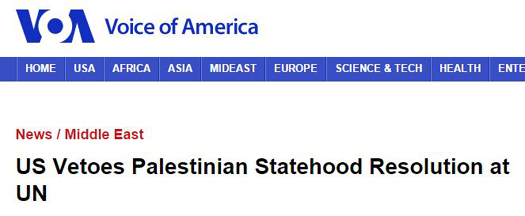
In January 2015, Voice of America wrongly described as a veto U.S. “no” vote at the UN Security Council on the Palestinian statehood resolution. The U.S. would have used its veto, but it didn’t have to as the resolution had failed to get the minimum nine “yes” votes required for adoption by the 15-member council.
U.S. taxpayers should not be paying for a media organization engaged in international audience outreach that embarrasses the United States and its diplomats with late, inaccurate or ambiguous news reporting. Immediate structural reforms are necessary. Former VOA director David Ensor had left at the end of May. VOA’s interim director Kelu Chao, who has a reputation of being a capable manager, has made some progress, but she was given to run an incredibly dysfunctional organization with serious structural and managerial problems caused by the IBB/BBG bureaucracy that no single executive can solve. The agency needs a complete overhaul.
RFE/RL has been without a permanent president/CEO for many months, but it seems to be doing remarkably well in terms of management and news reporting compared to VOA. It does, however, face some unresolved long-term and more recent labor-managment issues.
It is time for BBG board members and the U.S. Congress to do something about the poor management and lack of effective leadership at the Broadcasting Board of Governors and the International Broadcasting Bureau and to protect surrogate media outlets from becoming like the rest of BBG/IBB federal bureaucracy.
